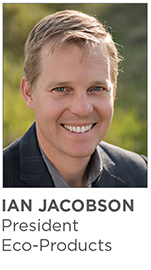2017 was a year of great progress on the path towards our Zero Waste future. As you will see in this report, we helped create front-of-house waste diversion success stories from coast to coast. Achieving a working Zero Waste system in a foodservice operation is no longer simply for those in Seattle, San Francisco, or Vermont. We are seeing traction in Minnesota, Ohio, Tennessee, and Colorado, just to name a few. Additionally, we continue to see tremendous courage and leadership in the form of emerging Zero Waste legislation from East Coast powerhouses like New York City and Washington, D.C., to Minneapolis, Seattle, and right here in Boulder, Colorado.
Most impressively, we consistently see that once a conversation has begun around organics diversion from landfills, a broader discussion ensues regarding a range of sustainability initiatives such as climate change and food insecurity, and we are proud to be on the forefront of that exchange of ideas. With that being said, the difficulties of creating a circular economy have never been more real. Recycling in general, and recycling plastics in particular, has seen a significant increase in threats posed by the Chinese National Sword Policy, effectively halting the export of collected recyclable material to China. Given the vast amount of material we’ve historically exported to China for recycling, this could have devastating impacts on the U.S. recycling industry. In related challenging news, the reported progress toward Zero Waste goals within some of our leading communities and states has stalled. For example, California and San Francisco struggle to push their diversion rates to the next level as they rely primarily on traditional recycling approaches. We continue to believe that improved organics diversion infrastructure — that includes the capacity for commercial composting of foodservice packaging and the food that accompanies it —will be necessary to achieve the ambitious Zero Waste goals set by these progressive communities. We remain confident that despite the macro headwinds, the success stories we continue to demonstrate at leading corporate campuses, college campuses, stadiums, hospitals, and restaurants will continue to show a successful path forward.
As we reflect on our sustainability goals in this annual report we are excited by the number of multiyear goals we’ve achieved since our reporting began in 2014. We also continue to be humbled by goals we’ve set for ourselves that remain stubbornly out of reach. As in past years, both the good and the bad will be made plain in the pages that follow. We remain steadfast that expanding access to commercial composting remains our top sustainability priority. While we are still not where we need to be, we are working with industry organizations such as the Food Service Packaging Institute®, BioCycle®, Sustainable Packaging Coalition®, and the U.S. Composting Council® to better understand where the gaps are in composting infrastructure and how to best fill them. We plan to continue to build on this work with renewed focus in 2018.
Internally, we continue to evolve our business to better help our partners reach their Zero Waste goals. We are especially excited about a few key advancements in 2017:
- Adding Operator Specialists: We created a new sales/sustainability hybrid role that will work with large operators to help them push toward Zero Waste. These individuals serve as “Sustainability Mavens in the field” and further our focus on connecting our customers with local composting infrastructure to close the loop.
- Expanding our Waste Diverters Database: We continue to make great progress on the creation of a Waste Diverters Database that tracks new and potential waste diverting success stories within our customer base. In 2018, we plan to use this new database to drive diversion throughout our operators. Just one more way that we are putting our customers’ needs front of mind.
- Development of our Supplier Scorecard: Tracking and reducing the impacts of our broader supply chain has been a key objective since our first sustainability report. This year, we began implementing this tool in the field, which has provided a standardized way to discuss progress on the sustainability initiatives of our suppliers and help them prioritize our shared goals within their operations.
- Achieved a B Corp Inclusivity Challenge Objective: Inspired by B Lab to set a sustainability goal focused on inclusivity, we set a goal to push for expanded commercial composting in diverse and underserved communities. To that end, we held our first Zero Waste Fest in Longmont, Colorado, to bring our expertise to this local community. We plan to replicate this effort in other communities in our state.
The year ahead looks to be every bit as exciting as 2017 has been for Eco-Products. While challenges remain and the work is never easy, the measurement and goal setting that comes from the sustainability reporting process keeps us focused and engaged on our mission to be part of the vanguard of our Zero Waste future. This annual measurement of our progress, our achievements, and our shortcomings keeps us energized as well as humbled, but it’s the shared waste diversion success stories that renews our spirit and fuels our passion.





